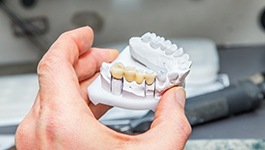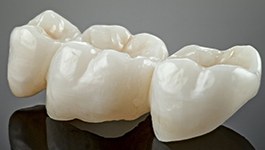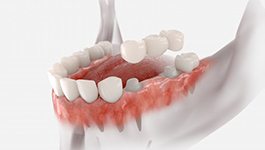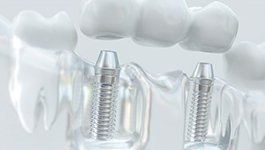Dental Bridges Wakefield
Bridge the Gap with Beautiful Restorations

Missing one or several teeth in a row can significantly detract from your smile’s appearance. Thankfully, modern dental bridges in Wakefield are lifelike enough to go unnoticed by observers, comfortable enough for their wearers to forget that they’re there, and durable enough to last for fifteen years or more with excellent care. Here’s a brief guide to how Dr. Schumacher can use a dental bridge to restore your smile and prevent dental drift and gum disease. Contact our office to learn more!
Why Choose Schumacher Dental for Dental Bridges?
- Experienced and Compassionate Dentist
- Bridges Customized for Each Patient
- Dental Insurance Welcome
What Is a Dental Bridge?

Dental bridges are restorative appliances that can replace one or several consecutive teeth with beautiful and functional dental crowns. This treatment can improve nutrition and prevent dental injury by restoring lost chewing ability while also preventing gum disease by protecting the soft tissues along the arch. The materials used ensure that these restorations are strong, beautiful, and able to last for fifteen years or more with proper care. Best of all, nearly anyone can be a good candidate for dental bridges if they have healthy teeth on either side of the gap in their smile or sufficient bone mass in their jaw to host dental implants.
Types of Dental Bridges

During your consultation with Dr. Schumacher, he will thoroughly inspect your teeth and ask about your goals to determine which type of bridge would work best for you. Based on his findings, he may recommend:
Traditional Dental Bridge

Traditional dental bridges are anchored in place by dental crowns cemented to the healthy teeth on either side of the gap. These crowns will support one or a line of several artificial teeth between them, creating a beautiful and durable restoration.
Implant Bridge

An implant bridge is supported with dental implants placed in the jawbone rather than crowns placed on neighboring teeth. This creates a sturdier hold and requires no alteration of the healthy tissue of existing teeth.
The Benefits of Getting a Dental Bridge

Dentists typically recommend that patients replace lost teeth as soon as possible to maintain their oral health. A few of the benefits dental bridges can carry include:
- Maintaining the alignment of your smile by preventing dental drift
- Requiring only an easy cleaning routine
- Enjoying a beautiful and lifelike smile
- Preserving your jawbone with implant bridges
- Results that can last for fifteen years with traditional bridges or thirty-five years or more with implant bridges
Dental Bridges FAQs
Can You Take a Dental Bridge Out?
Dental bridges are permanently bonded to neighboring teeth or dental implants, so they stay secure enough to resist the forces of daily use. However, it is possible for Dr. Schumacher to remove a fixed bridge safely if it needs maintenance or replacement.
If you’re unsure about your bridge or need adjustments, our team can help assess your mouth and provide advice. Alternatively, if you prefer a prosthetic that can be removed freely for cleaning, you might consider a partial denture instead. These are attached to your teeth via metal brackets or clasps and can be easily taken out whenever you need.
Is Getting a Dental Bridge Painful?
Getting a dental bridge shouldn’t be painful. Our team uses local anesthesia to numb the area, to make sure you’re comfortable during the procedure. At most, you may feel pressure from the instruments Dr. Schumacher uses. If you’ve ever had a filling done, the sensation should be much like that.
Some patients experience temporary sensitivity or soreness after the procedure, but this typically subsides within a few days. In the meantime, you can use over-the-counter pain relief and good oral care to manage any discomfort.
How Long Should a Dental Bridge Last?
With proper care, dental bridges can last 10-15 years or longer! Good oral hygiene and regular checkups with our team will help extend the life of your restoration. If you want to get the most out of your new bridge, examine your habits.
Certain lifestyle factors like smoking, vaping, chewing hard or sticky foods, and teeth grinding can negatively affect longevity over time. If you communicate these habits with our team, we can offer resources and treatments that could help lessen or break them.
How Many Teeth Can a Dental Bridge Replace?
Dental bridges can replace one to four missing teeth, depending on the situation and structure of neighboring teeth. However, replacing more than one or two may require additional support, like dental implants, to keep the bridge stable, especially if the anchor teeth aren’t particularly healthy. Factors like your bite, oral health, and jaw strength will help Dr. Schumacher decide the best way to place a bridge in your mouth for a natural-looking, functional smile.
